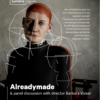Slicing, Blackboxing and Queer Cutting
A MERIAN reading group on futures of biomedical 3-D imaging practices
Thursday 24 February 2022
16:00 – 18:00 (CET)
Jan van Eyck Academie
On site event with the possibility to join virtually
To join, send an email to info@merianmaastricht.nl and receive the texts and Zoom link.
During this public reading group we welcome participants to discuss two texts from recent books on the politics of imaging, automation and 3-D computation. Authors Jara Rocha, Femke Snelting and Silvia Casini will be present to discuss these texts with the reading group partici-pants and to reflect together on medical imaging and experimental and artistic interventions into this field. The reading group is co-organized and chaired by Antye Guenther (MERIAN PhD candidate), Flora Lysen (Maastricht University, MERIAN) and Femke Snelting (Constant, MERIAN).
In their forthcoming book Volumetric Regimes: material cultures of quantified presence (Open Humanities Press, 2022), authors Jara Rocha and Femke Snelting bring together several years of discussing and working with artists, software developers and theorists who detect, track, print, model and render volumes. We will read and discuss the chapter “Invasive Imagination and its Agential Cuts”. The authors argue that tomography, a set of digital techniques which has be-come ubiquitous in the medical imaging field, produces “exclusionary boundaries,” i.e. that they generate outcomes according to pre-established categorizations and norms of the human body. Zooming in on the example of the Open Source “3-D Slicer” software, they show how digital cutting is part of a culture of quantification, and naturalised as a scientifically objective gesture. Rocha and Snelting challenge this dominant imagination of biomedical informatics and mount an “affirmative critique” by proposing technical tweaks and changes, thus opening up the possibility of “oblique, deviating, unfinished and queer cuts.”
The second reading is from a recently published book by Silvia Casini, Giving Bodies Back to Data: Image Makers, Bricolage, and Reinvention in Magnetic Resonance Technology (MIT Press, 2021), which traces the development of the first nuclear magnetic images of a lemon and a mouse in the 1970s to very recent new scanning techniques that would allow for “personalized and predictive” medicine. Casini pays special attention to the work of artists who collaborate with image makers to reflect on the (often forgotten) craftsmanship that is key to making medi-cal images, as well as the experiences and forms of the body that cannot be captured by quanti-tative data generated by the machine.
Reading
1. Rocha, Jara, and Femke Snelting, eds. “Invasive Imagination and Its Agential Cuts.” In Volu-metric Regimes: Material Cultures of Quantified Presence. London: Open Humanities Press, 2021.
– Casini, Silvia. “Visualizing Uncertainty in MRI Reinvention.” In Giving Bodies Back to Data: Im-age Makers, Bricolage, and Reinvention in Magnetic Resonance Technology, 152–88. Cam-bridge: MIT Press, 2021. And 2. Casini, Silvia. “Intermezzo Lives in the Grid.” In Giving Bodies Back to Data: Image Makers, Bricolage, and Reinvention in Magnetic Resonance Technology, 189–202. Cambridge: MIT Press, 2021.
Bios
Silvia Casini is a senior lecturer in Film and Visual Culture at the University of Aberdeen. Her work is situated at the crossroad of visual culture, medical humanities and science and technol-ogy studies. She is the author of several articles on the aesthetic, epistemological and societal implications of scientific visualisation. She was awarded a Leverhulme Research Fellowship to complete her second book “Giving Bodies Back to Data: Image Makers, Bricolage, and Reinven-tion in Magnetic Resonance Technology, which is published in the MIT Press Leonardo book series.
Flora Lysen is a researcher at the MUSTS (Maastricht University Science and Technology Studies) research group and teacher at the Faculty of Arts & Social Sciences of the UM. Her current re-search is on the history of artificial intelligence in medical imaging. She is also a tutor at the fine arts MA “F for Fact” at the Sandberg Institute Amsterdam, a program examining alternative facts, speculative fiction and imagined pasts and futures. Her monograph “Brainmedia: One Hundred Years of Performing Live Brains, 1920-2020,” a book about mediating the human brain in and beyond the laboratory, is forthcoming from Bloomsbury.
Antye Guenther is a visual artist, and artist researcher. Highly influenced by feminist science fiction, Guenther’s practices orbit around themes like (non)biological intelligence and super-computing, think tank ideologies and self-optimisation, (scientific) representations of cognitive processes and mind control. Her mostly collaborative work comes in hybrid forms: performative ceramic objects, fictionalised video tutorials, speculative scripts, artist publications, and narra-tive installations.
Femke Snelting is based in Brussels, and develops projects at the intersection of design, femi-nisms, and free software in various constellations. With Seda Guerses, Miriyam Aouragh, and Helen Pritchard, she runs the Institute for Technology in the Public Interest. Together they create spaces for articulating what computational technologies in the “public interest” might be when “public interest” is always in-the-making. With the Underground Division (Helen Pritchard and Jara Rocha) she studies the computational imaginations of rock formations and with Jara Rocha, Femke activates the disobedient action research project Volumetric Regimes. Between 2003 and 2021, she coordinated the artistic program of Constant, association for art and media based in Brussels. Femke supports artistic research at PhdArts (Leiden), MERIAN (Maastricht) and at a.pass (Brussels). She teaches at XPUB (Master programme for experimental publishing, Rotterdam). http://snelting.domainepublic.net
Jara Rocha is an interdependent researcher-artist. They are currently involved in several diso-bedient action research projects, such as Volumetric Regimes (with Femke Snelting), The Un-derground Division (with Helen Pritchard and Femke Snelting), The Relearning Series (with Mar-tino Morandi), and Vibes & Leaks (with Kym Ward and Xavier Gorgol). They are part of the cura-torial teams of DONE at Foto Colectania, of ISEA at Santa Monica and of La Capella, all in Barce-lona; Jara also teaches screen studies at ESCAC, as well as at the Körper, Theorie und Poetik des Performativen MFA at Stuttgart. With Karl Moubarak and Cristina Cochior, they conform the Cell for Digital Discomfort at the 21/22 Fellowship for Situated Research of BAK, Utrecht. Jara works through the situated, mundane, and complex forms of distribution of the technological with an antifascist and trans*feminist sensibility, and their show “Naturoculturas son disturbios” emits monthly from dublab.es radio. https://jararocha.blogspot.com
MERIAN
This reading group is organised and chaired by Antye Guenther (MERIAN PhD candidate), Flora Lysen (post-doc Maastricht University), and Femke Snelting (independent researcher and artist, adviser at Jan van Eyck Academie as part of MERIAN (Maastricht Experimental Research In and through the Arts Network).
MERIAN is a space for collaborative research in between making and thinking. PhD candidates engage in innovative styles of research, utilizing the powers and fragilities of artistic and scien-tific practices. Their research addresses urgent matters of societal concern apparent in the Meuse-Rhine Euregion. This collaboration between Maastricht University, Zuyd University of Applied Sciences and the Jan van Eyck Academie – department of Research & Education, builds on existing expertise from the research, arts and higher education networks in Maastricht.





